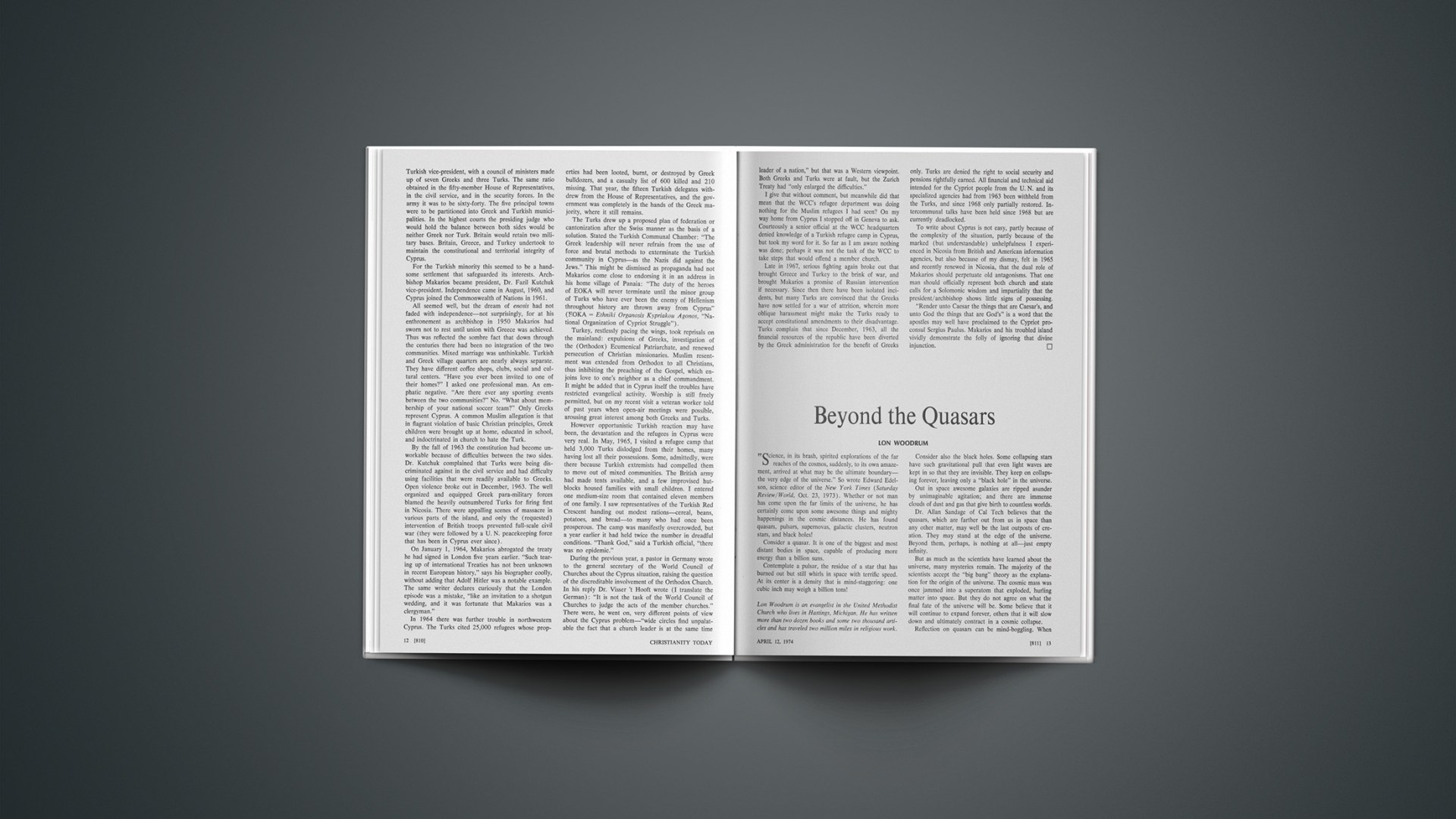‟Science, in its brash, spirited explorations of the far reaches of the cosmos, suddenly, to its own amazement, arrived at what may be the ultimate boundary—the very edge of the universe.” So wrote Edward Edel-son, science editor of the New York Times (Saturday Review/World, Oct. 23, 1973). Whether or not man has come upon the far limits of the universe, he has certainly come upon some awesome things and mighty happenings in the cosmic distances. He has found quasars, pulsars, supernovas, galactic clusters, neutron stars, and black holes!
Consider a quasar. It is one of the biggest and most distant bodies in space, capable of producing more energy than a billion suns.
Contemplate a pulsar, the residue of a star that has burned out but still whirls in space with terrific speed. At its center is a density that is mind-staggering: one cubic inch may weigh a billion tons!
Consider also the black holes. Some collapsing stars have such gravitational pull that even light waves are kept in so that they are invisible. They keep on collapsing forever, leaving only a “black hole” in the universe.
Out in space awesome galaxies are ripped asunder by unimaginable agitation; and there are immense clouds of dust and gas that give birth to countless worlds.
Dr. Allan Sandage of Cal Tech believes that the quasars, which are farther out from us in space than any other matter, may well be the last outposts of creation. They may stand at the edge of the universe. Beyond them, perhaps, is nothing at all—just empty infinity.
But as much as the scientists have learned about the universe, many mysteries remain. The majority of the scientists accept the “big bang” theory as the explanation for the origin of the universe. The cosmic mass was once jammed into a superatom that exploded, hurling matter into space. But they do not agree on what the final fate of the universe will be. Some believe that it will continue to expand forever, others that it will slow down and ultimately contract in a cosmic collapse.
Reflection on quasars can be mind-boggling. When a scientist observes a quasar he is not looking at it as it is today; he is seeing it as it was more than ten billion light-years ago! One cannot actually bring such figures into mental focus. We toss about the word “light-years” without envisioning just what it signifies. Light moves at a distance of several times around our planet by the time we can say the word “earth.” But imagine light continuing on at that speed for just two months; in that time it will have traveled only one-sixth of a light-year—but it will have gone a trillion miles! In twelve months it will have traveled one light-year—or six trillion miles. Try multiplying that by a billion, then multiplying the figure you get by ten! Better forget the matter of mileage when you try to think how far it is to the quasars.
Such terrifying immensity causes us to realize just how teeny we really are. The earth which we people is but a grain of sand on a measureless beach. Yet one scientist said to a newspaper reporter, “You think all that out there is something? I’ll tell you something far more amazing: that tiny creatures like us can realize it’s out there! Little man is equipped with a mind that lets him study the cosmic drama as if he were viewing a bug!”
Thinking of such things reminds us of the cry of the long-ago Psalmist: “What is mere man that you are so concerned about him?” The God who “sprinkled all the midnight with a powdered drift of suns” is concerned about the tiny earth-ship because on that ship man makes his voyage.
The God who keeps check on quasars and supernovas and black holes is aware when a baby sparrow tips out of his nest and falls to the ground. He knows everybody’s name, where he lives, what he’s doing, how he feels. “Even the hairs on your head have all been counted,” Jesus said.
The universe is awfully big, but not so big as the One who created it. Not only did he make all things, but he knows their end. “Lord, in the beginning you made the earth, and the heavens are the work of your hands. They will disappear into nothingness, but you will remain forever. They will become worn out like old clothes, and some day you will fold them up and replace them. But you yourself will never change, and your years will never end” (Heb. 1:10–12, Living Bible).
Beyond the quasars, says Dr. Sandage, there is nothing. But there is something! Rather, there is Someone. He has promised us by his Son that when worlds rush off into infinity his Word will still stand. A New Testament seer foresaw the collapse of worlds, but he saw far beyond that. He wrote, “We have his promise, and look forward to new heavens and a new earth, the home of justice” (2 Pet. 3:13, NEB).
Who can tell what the God who can make a quasar with the energy of a billion suns has planned for those who serve him? The power that puts a billion tons in a cubic inch of matter is on the side of those who love him. He has promised that the very end of our universe is the beginning of a better world. He is the cosmic Gentleman. He will keep his word.










